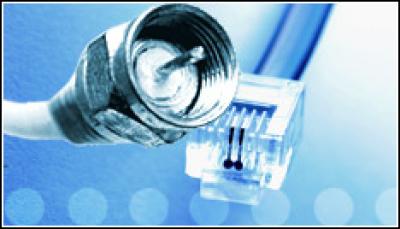Tories Pledge Super-Fast Broadband By 2017

Shadow chancellor George Osborne has promised to provide super-fast broadband by 2017, but the Labour government says the Tories are just playing catch-up
The Conservative Party has announced plans to improve the UK’s Internet infrastructure if it wins the general election, promising speeds of 100 Mbps for the “majority” of homes by 2017.
In an interview on the BBC’s Andrew Marr Show, shadow chancellor George Osborne said money from private investors would provide better cabling in towns and cities, while a portion of the BBC’s licence fee would be used to pay for coverage in less lucrative rural areas.

“In the 19th Century we built the railways. In the 20th Century we built the motorways. In the 21st Century let’s build the super-fast broadband network that will create hundreds of thousands of jobs for Britain,” said Osborne.
However, the Labour government has accused the Tories of “playing catch-up” on broadband improvements. Treasury Minister Stephen Timms said “Labour have already announced measures for rolling out broadband across the country – and the Tories have opposed the plans to make that happen.”
In December, chancellor Alistair Darling approved the government’s proposal for a 50p-per-month broadband tax in the Pre-Budget Report. Under the scheme, anyone with a fixed line phone will be obliged to pay the tax, which will be used to provide super-fast broadband to 90 percent of UK households by the end of 2017.
Despite plans to implement the broadband tax by January this year, the process has been delayed due to a consultation exercise on how the “Next Generation Fund” should be allocated. Meanwhile the Conservative Party has already announced that it would scrap the tax “as soon as possible” if it won power at the next election, warning that “heavy-handed state intervention” will deter private companies from investing money to upgrade the country’s Internet infrastructure.
The broadband tax, which is expected to raise around £175 million a year, has attracted much criticism from industry experts, some of whom say the fund will fall a long way short of the amount needed to provide super-fast fibre services to every UK home. BT has already warned that the government’s Digital Britain plans may need rethinking, estimating that the cost of the roll-out will be closer to £5 billion.
Campaigners and ISPs such as TalkTalk have also warned that the tax will end up being higher than predicted. “General taxation would be fair and proportionate, but this tax is regressive and hits the poorest people hardest,” said Andrew Heany, director of strategy and regulation at TalkTalk. He went on to claim that, despite the government’s aim for digital inclusion, the broadband tax would mean 100,000 fewer people on the Internet.
The Tories claim their new strategy would end BT’s “local loop monopoly”, enabling other operators to install their own ducts and fibre cables. “We are currently one of the slowest countries in the developed world for broadband. With the Conservatives we’ll become one of the fastest,” he added.
However, the Liberal Democrats have accused the Tories of operating fantasy world economics. “Anyone can promise the earth,” said culture, media and sport spokesman Don Foster. “What matters is how you pay for it. All independent research shows that the market simply cannot provide high speed broadband in all parts of the country in the short term without investment.”
Many parts of telecoms policy are in political limbo with the election impending, including rural broadband provision which faces a stalemate between Labour’s “industrial activism” and the Conservatives’ “market activism”, according to the Broadband Stakeholder Group.
Meanwhile, radio spectrum policy is also suffering from political uncertainty, as crucial auctions are being held back as they become “political orphans” according to spectrum broker Kip Meek.